Manage custom chaos hubs
This topic shows how to save and manage experiments in your custom chaos hub(s), and how to sync your chaos hub GitHub repo with Harness. Go to Add a custom chaos hub for setup instructions.
View chaos hubs
The experiments you see in various chaos hubs are actually templates from which you can launch the experiments after specifying some details.
To view the default and custom chaos hubs:
In Harness, navigate to Chaos > ChaosHubs.
This page lists the default Enterprise Chaos Hub, and any custom chaos hubs.
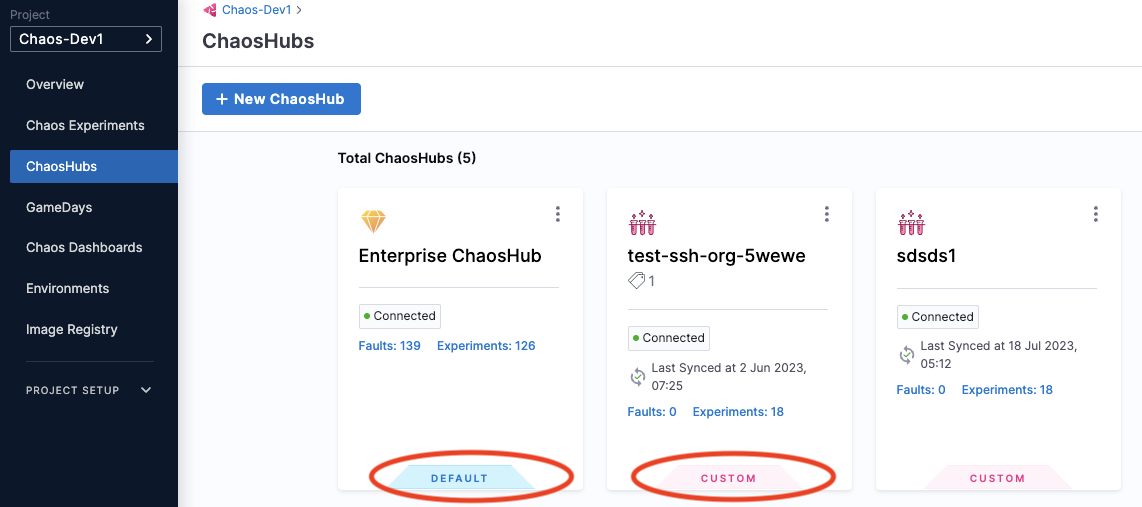
Select the chaos hub you want to view.
The experiments below are in a custom hub. All experiments are displayed by default. You can select a tag (circled below) to see experiments with that tag applied.
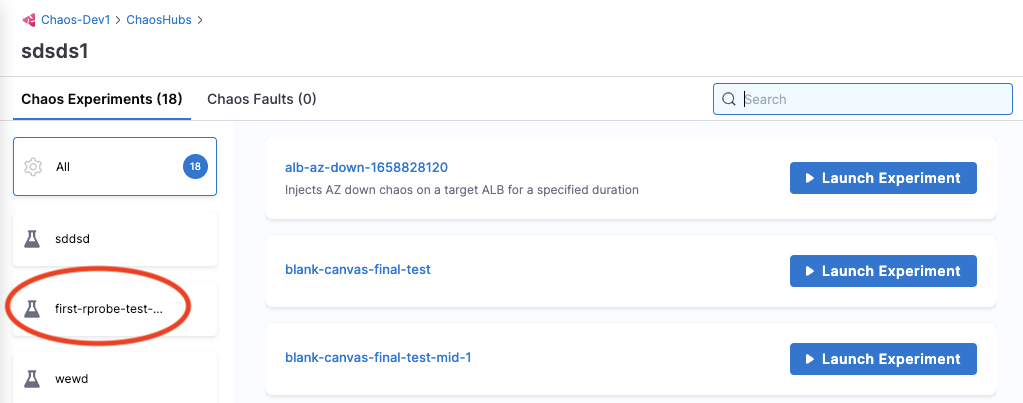
The experiments below are in the default Enterprise Chaos Hub. They are organized by platform/technology.
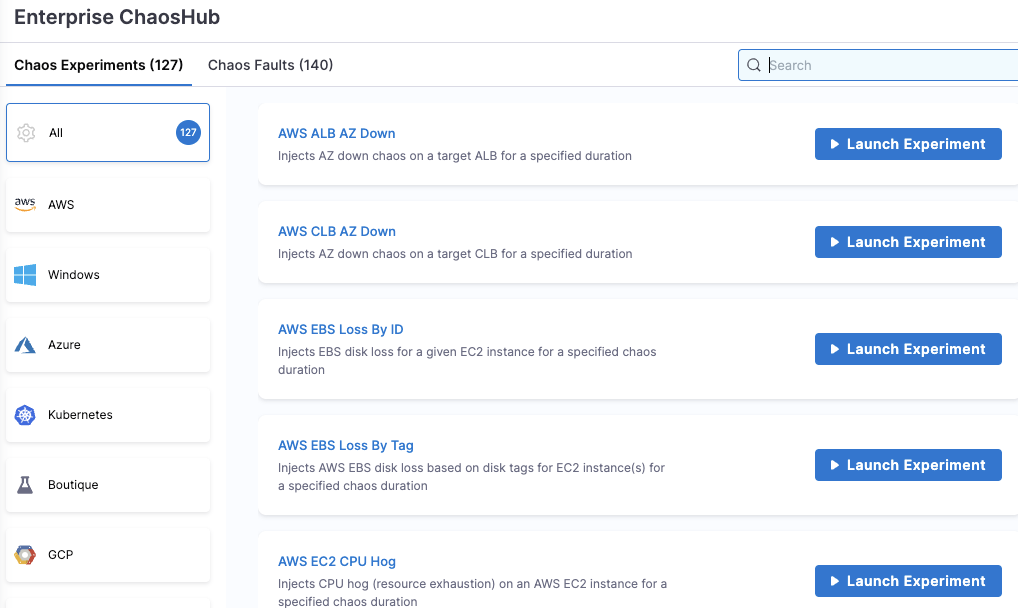
Add experiments to a custom chaos hub
When you add an experiment to a custom chaos hub, it's saved as a template from which you can launch the experiment after specifying some details.
To add an experiment to a custom chaos hub:
Create an experiment as usual.
In the Chaos Experiments page, find the experiment you want to add to a custom chaos hub, select the More options icon (⋮), and then select Add to ChaosHub.

In the Save to ChaosHub screen, verify the Name, Description and Experiment Category Tag.
To add a new tag, type its name and then press the Enter/Return key.
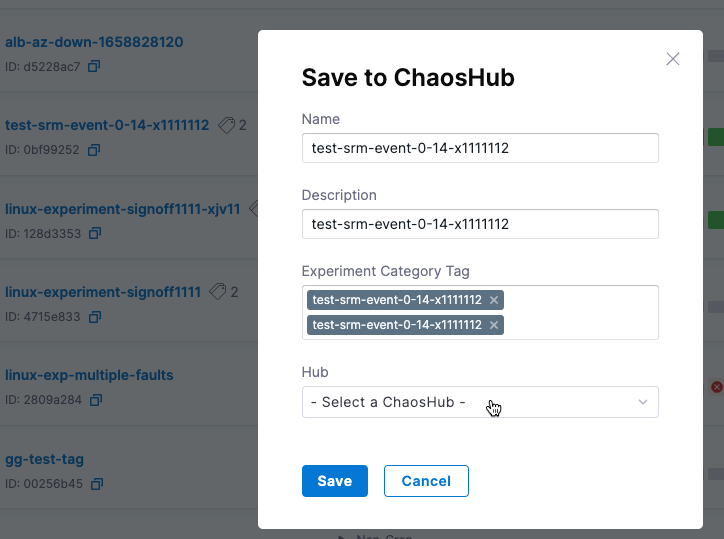 tip
tipIncluding Experiment Category Tag(s) helps organize your experiments. When you view the custom chaos hub, you can see all experiments as well as experiments grouped by tag.
Select the Hub field, choose the custom chaos hub you want to add the experiment to, and then select Apply.
Select Save.
This saves your experiment as a template in a custom chaos hub.
You can also save an experiment as a template to a custom chaos hub when creating the experiment in Chaos Studio. The Save button saves the experiment itself so that it appears on the Chaos Experiments page. Selecting the down-arrow next to Save lets you add the experiment as a template to a custom chaos hub.

Sync Harness with a chaos hub Git repository
When you connect a custom chaos hub, you can add and edit experiments in that hub in either Harness or the custom hub's GitHub repository. When you make changes in Harness, your repository is synced automatically. When you make changes in your repository, you must sync it with Harness using the UI.
To sync your custom chaos hub's git repo with Harness:
In Harness, navigate to Chaos > ChaosHubs.
Select the More options icon (⋮) for the hub you want to sync, and then select Sync Hub.
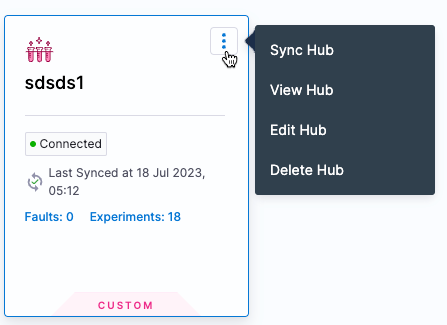
Launch an experiment from a chaos hub
You can launch experiments from the default Enterprise Chaos Hub or from custom hubs.
Launching the experiment from a hub is different from running an experiment from the Chaos Experiments page. The experiments in chaos hubs are actually templates, so when you launch them from a hub you must provide some additional details. The experiments in the Chaos Experiments page execute immediately, as configured, when you run them.
To launch an experiment from a chaos hub:
In Harness, navigate to Chaos > ChaosHubs, and then select the hub you want.
Find the experiment you want to launch, and then select Launch Experiment.
Select a chaos infrastructure, and then select Next.
You can change the infrastructure type if necessary.
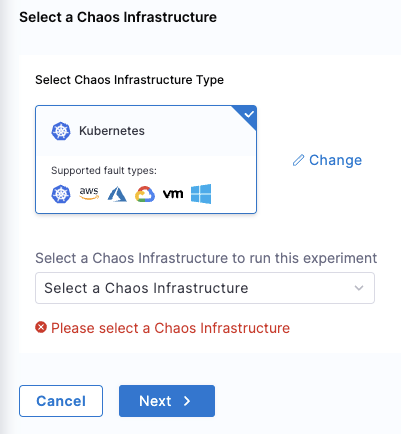
Chaos Studio is displayed when you select Next.
In Chaos Studio's Experiment Builder, select the faults in the experiment to configure them.
You can add more faults or delete faults from the experiment, or update the sequence of faults.
Select Run to execute the experiment.
You can also save your customized experiment as a template in a chaos hub using the Save button.